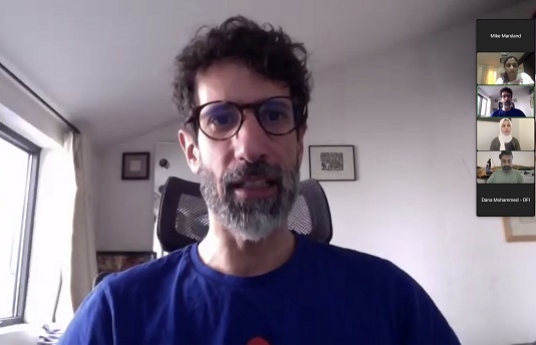مشاريع أفلام مشاركة في قمرة تتناول قصصاً شخصية ومعالجة سياسية تهدف لبناء الجسور من خلال السينما
22 مارس 2022

- أفلام روائية ووثائقية طويلة تدعمها الحاضنة السينمائية لمؤسسة الدوحة للأفلام تتميز بمواضيعها الجريئة التي تبحث في عمق المشاعر الإنسانية والمواقف السياسية القوية
الدوحة، قطر، 22 مارس 2022: تهدف مشاريع الأفلام الروائية والوثائقية الطويلة من العالم العربي والتي تشارك في ملتقى قمرة السينمائي 2022 إلى بناء الجسور والتواصل مع الجمهور العالمي من خلال طرحها لمواضيع جريئة تعالج آلام الصراعات الأهلية والسياسية.
وفي الموجز الصحفي لصناع الأفلام خلال الملتقى، شارك هؤلاء تجاربهم السينمائية مشيدين بالدعم الكبير الذي تلقوه من مؤسسة الدوحة للأفلام لمساعدتهم على صقل أعمالهم وقدراتهم السينمائية لتقديم قصصهم إلى العالم بإقناع وثقة.
صانع الأفلام كريم بن صلاح، مخرج فيلم “الضوء الأسود“ (الجزائر، فرنسا، قطر) والذي يعيش حالياً في فرنسا، يقول بأنه يحمل قصص وطنه الأم ويستخدم السينما كوسيلة للتعبير عن القضايا الشخصية والسياسية. وأضاف “في الأفلام أحاول بأن أخلق هويتي الخاصة وأعرض مشاعري الداخلية وأخرجها إلى العالم. أحاول أن أفتح فضاءات من الثقافات المختلطة التي أراها وأبني جسور التفاهم مع الناس في مختلف أرجاء العالم”.
يروي الفيلم قصة سفيان، الطالب الجزائري الذي يعيش في فرنسا ويقع ضحية قرار إداري وتصبح إقامته غير شرعية. وفي محاولة لتصحيح وضعه، يجد عملاً في دار جنائز إسلامية فيعيش تجربة غيرت حياته. “إن الرحلة الشخصية في الفيلم تحددها عناصر الروحانية وعلاقتها مع الموت، ومن خلال ذلك كله أحاول أن أعرض عالمية المعاناة البشرية”.
كريمة سعيدي، المخرجة لفيلم “أولئك الذين يراقبون“ (بلجيكا، فرنسا، قطر) استلهمت فيلمها من جدتها وهي من الجيل الأول من المهاجرين إلى بلجيكا. وقالت “إنها قصة أجدادنا الذين عاشوا في هذا البلد وكيف تغيرت المفاهيم وتطورت على مدار الأجيال الثلاثة السابقة. من خلال تقديم قصتي في مدفن متعدد الأديان، أقدم جانباً آخر للهجرة، عن الذين ماتوا بعيداً عن وطنهم الأم، وعن أحبائهم الذين أقاموا علاقات جديدة معهم”.
“البصير – سائق العربة الأعمى“ (سويسرا، العراق، قطر) للمخرج علي الفتلاوي، فيلم سياسي عميق يدور حول رجل أعمى يجوب في طرق جنوب العراق ويلتقي بامرأة غامضة. يقول الفتلاوي أن الفيلم مستوحى من تجربة حياته الشخصية وأضاف: “اثنتان من عماتي كانتا كفيفتان، وعشت الحروب في العراق في طفولتي في الثمانينات. عندما تركت العراق وانتقلت إلى زيورخ، دفعتني الحرب الأهلية في عام 2007 إلى الغضب الشديد. أردت حينها أن يكون جميع العراقيين مثل عماتي حتى لا يطلقوا النار على بعضهم البعض. وهذه كانت نقطة البداية لفيلمي.”.
عاد المخرج علي إلى صندوق ذكرياته الخاص لصناعة فيلم سياسي وسيريالي في الوقت نفسه، ليعرض من خلاله الجمال الأثيري لبلده والذي نادراً ما يظهر في الأفلام. وأوضح: “أريد أن يفهمنا الناس بشكل أفضل من خلال قصص أصلية، ومن خلال الأشياء البسيطة التي نحبها ونقدرها، وأردت أن أقدم مواضيع نراها من خلال قلوبنا وليس أعيننا”.
الفيلم الوثائقي الطويل “أبي قتل بورقيبة“ (تونس، قطر) قصة شخصية أخرى تقدمها المخرجة فاطمة رياحي الذي شكل لها العام 1987 حدثاً سياسياً مفصلياً في تونس وكذلك حدثاً عائلياً شخصياً قلب حياتها وحياة أسرتها رأساً على عقب. يتتبع الفيلم بحثها عن قصة والدها الذي بدأ بعد 15 عاماً من وفاته. وتحدثت عن مشروع فيلمها قائلةً: “الأمر صعب للغاية، ليس من السهل أن تضع حياتك الشخصية في سبيل الحقيقة. لكني اعتقدت بأنه من المهم أن أسرد قصتي، بحيث تعكس الجوانب النفسية للتجارب السياسية في تونس”.
تتبع أحداث الحياة الواقعية لصناعة فيلم روائي يتمثل في مشروع “المصور“ (سوريا، قطر، ألمانيا) للمخرج أنس خلف المقيم في قطر. يروي الفيلم قصة مصور فوتوغرافي عمل في منصب فريد في داخل الحكومة السورية خلال الثورة في عام 2011، ويقرر أن ينشق ويهرب معه الدليل الذي برأيه يمكن أن يدين نظام بشار الأسد. وقال أنس بأنه بنى قصته مرتكزاً على تجارب شخصية خصوصاً بعد مشاهدته للمفاهيم الخاطئة والمغلوطة حول الذي يجري على الأرض. وقال: “بسبب اللوبيات والدعايات الكاذبة، الكثير من الناس من العالم العربي يواصلون الدفاع عن النظام. رسالتي هنا مشابهة للفيلم الذي صنعته من قبل “المترجم“، وهي إبلاغ الجمهور حول العالم عن الذي يجري حقيقة في سورية”.
المخرجة أسماء جمال تجسد موضوعاً ملهماً في مشروع فيلمها “حلمي أطير“ (مصر، قطر) ويدور حول مجموعة من الشباب من الأحياء الشعبية المزدحمة في القاهرة يهربون من واقعهم اليومي الصعب على الدراجات النارية حيث يجوبون الشوارع في الليل. وقالت “لقد نشأت في العشوائيات في القاهرة وكنت مهتمة بحياة الشباب الذين لديهم شغف بالدراجات النارية. القاهرة مكونة من مجمعات سكنية وطرقات سريعة، وخلف ذلك، تدخل إلى عالم العشوائيات والأحياء الشعبية. يظهر فيلمي كيف يبتكر هؤلاء الشباب في العشوائيات حياة موازية لواقعهم ويحققون أحلامهم وشغفهم. أحاول أن أربط بين العالمين لهؤلاء الناس الذين يطيرون بأحلامهم بأشياء بسيطة، منها وسيلة التنقل على سبيل المثال”.
وشدد صناع الأفلام على أهمية مبادرات مؤسسة الدوحة للأفلام وخصوصاً قمرة في لعب دور رئيسي في بناء جسر بين الثقافات من خلال السينما وتوفير مساحة أفضل لأفلامهم لمشاهدتها من الجمهور في العالم العربي.